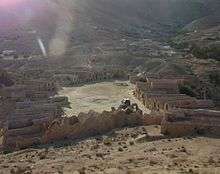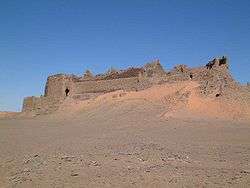Ksar
.jpg)
Ksar, plural ksour (Maghrebi Arabic: قصر qser, plural qsur) is the North African Meghrebi Arabic term for "castle", possibly loaned from Latin castrum.
Related terms
The counterpart of Maghrebi ksar in literary Arabic, qaṣr, means "castle" or "palace"[1] and it is found in this form elsewhere in the Muslim world.
The Berber (Amazigh) original word for "ksar" used in North Africa by the Berber-speaking populations is aghrem (singular) or igherman (plural). In the Maghreb, the term has a more general meaning of "fortified village,"or "fort". The Berber word igherman might be a cognate word, with an identical meaning, with the word Garamantes, which is the name of the ancient Berber city-states in modern-day Libya.
Architecture
Ksour in the Maghreb typically consist of attached houses, often having collective ghorfa (granaries) and other structures like a mosque, bath, oven, and shops. Ksour / igherman are widespread among the oasis populations of North Africa. Ksars are sometimes situated in mountain locations to make defense easier; they often are entirely within a single, continuous wall. The building material of the entire structure is normally adobe, or cut stone and adobe. The idea of the ksar as a granary is a confused notion of two things, the granary itself, found within a ksar, and the ksar, which is a village, normally with granaries within it. Ksars form one of the main manifestations of Berber architecture.
Places named Ksar
The word is part of place names across Morocco, Algeria, and Tunisia, — the region called the Maghreb; and is particularly prevalent on the Saharan side of the various ranges of the Atlas Mountains and the valley of the Draa River.

- Ksar es-Seghir, Moroccan stronghold in the Straits of Gibraltar, between Tangier and Ceuta
- Ksar-el-Kebir, location of the Battle of Al Kasr al Kebir, influenced Moroccan, Portuguese and Spanish history
- Ksar Nalut, Libya
- Ksar Ouled Soltane, Tunisia
See also
- Maghreb placename etymology
- Alcázar (also Alcácer or Alcasser)
- Ghorfa
- Ribat
References
- ↑ Hans Wehr, J M. Cowan. A dictionary of modern written Arabic. Third Edition. Ithaca, N.Y.: Spoken Language Services. p. 768.
External links
- www.ksour-tunisiens.com Complete documentation of all ksour of southern Tunisia, Herbert Popp & Abdelfettah Kassah
